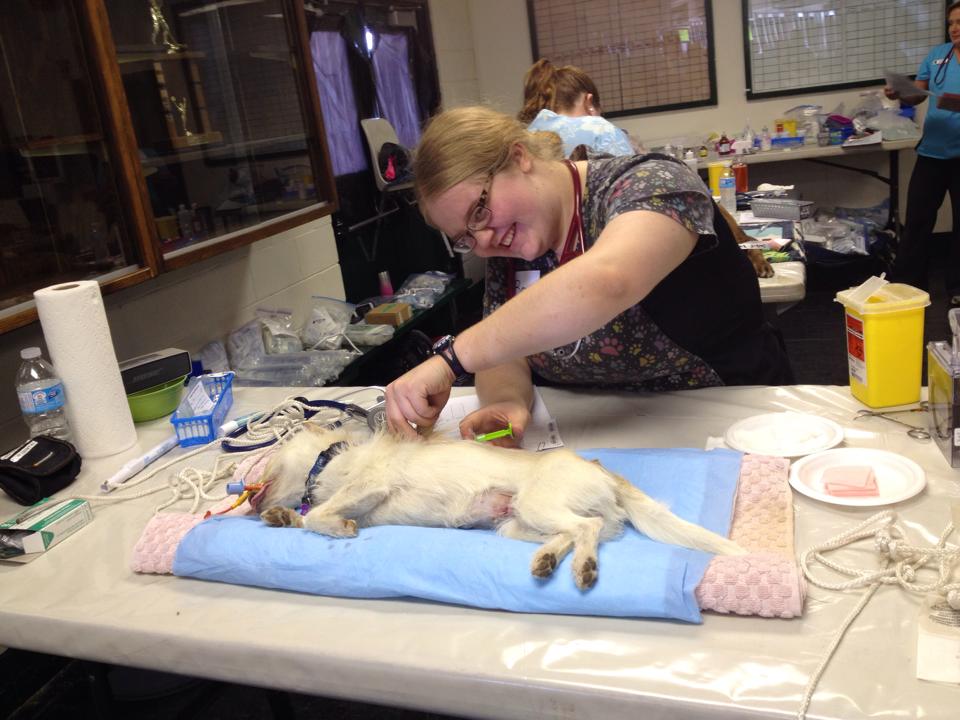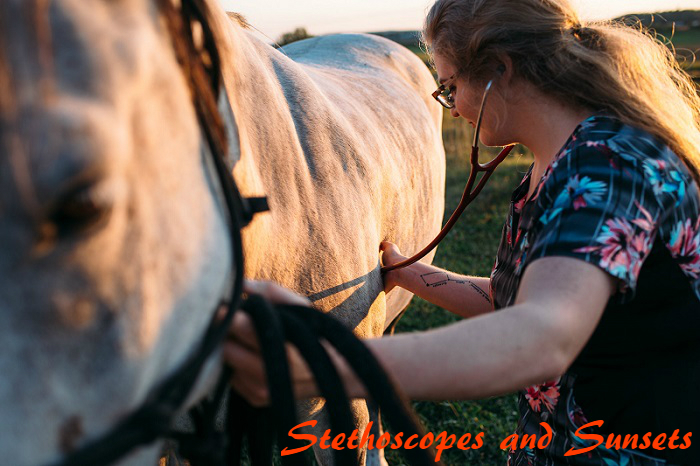 [Manning the Vaccination Station on a spay/neuter trip with CAAT! This anesthetized little pup was just spayed and sleeping off the last of her drugs, not even feeling the quick pokes of her DAP and rabies vaccines. I feel very lucky to be a part of reducing preventable diseases in small communities!]
[Manning the Vaccination Station on a spay/neuter trip with CAAT! This anesthetized little pup was just spayed and sleeping off the last of her drugs, not even feeling the quick pokes of her DAP and rabies vaccines. I feel very lucky to be a part of reducing preventable diseases in small communities!]
In the last part of our vaccine series, we’ll discuss the final four important myths and concerns surrounding vaccination. Read on to learn the truth about ‘vaccine overload’, toxins in vaccines, adverse reactions to vaccines, and whether or not vets recommend vaccines just for the money (spoiler: no!). Feel free to catch up on Part One, Part Two, Part Three, and Part Four of the series and be sure to join me next week for a return to creative nonfiction!
“By giving so many vaccines to our puppies/kittens and over our pet’s lives, we are overloading and damaging their immune systems.”
This myth is simply that — a myth, not based in truth in any way. The amount of antigens contained within a vaccine is absolutely minuscule compared to the amount of antigens our pets (and us!) are exposed to on a daily basis simply by living! Inhaling, touching things, having cuts or scratches, eating food, licking things, chewing toys, sniffing friends, going for walks…these are all things which expose our pets to countless antigens for countless potential threats. The immune system’s ability to take in all these things, mount responses, and learn immunity is vast — vaccines are merely a drop in the bucket. Given in the recommended doses on the recommended schedule, vaccines will not overload the immune system any more than taking your pet to the dog park! And by performing the whole puppy/kitten series — a vaccine given every 3-4 weeks from roughly 6-16 weeks depending on when you start — we can insure that as soon as the maternal antibodies wear off, the vaccine can step in and do its job teaching the immature immune system how to protect its host!
“Vaccines are full of mercury and other toxins which can seriously harm my pet’s health.”
Apart from the potential of an allergic reaction (which I’ll discuss next), the ingredients in a vaccine will not cause harm to your pet. Vaccines do contain ingredients beyond just antigen — of course they do! They need a carrier medium and preservatives to ensure that they’re not introducing dangerous bacteria into your pet’s body at the same time as an inactivated or killed virus. Many vaccines also contain ingredients known as adjuvants, which are irritating and designed to provoke a response from the immune system as well as slowing the release of the antigen, improving the response. In fact, a veterinarian — Gaston Ramon — is considered the ‘father of adjuvants’ after discovering in the 1920s that he could produce a much better immune response when the injection site was irritated…injecting ingredients such as breadcrumbs and tapioca! Nowadays, aluminium salts are the most commonly used adjuvants.
Many animal vaccines also contain thimerosal, a preservative. This is the reason for concern over ‘mercury in vaccines’ as thimerosal is broken down into ethylmercury in the body. However! Ethylmercury is much different than methylmercury, the mercury which forms in the environment and frequently enters our body through eating fish and other foods. Methylmercury accumulates in the body over time and can cause health concerns, while ethylmercury is rapidly metabolized and excreted without building up. It has never been shown to cause health issues other than local allergic reactions in sensitive individuals in either humans or pets.
“Vaccines can cause serious adverse reactions in any pet.”
This is an interesting one because it’s fact, not myth — but it’s important to weigh the benefits of the vaccine against the possibility of reaction. The most common ‘vaccine reaction’ is lethargy and inappetence following the vaccine, the same way we often feel a bit gross after getting our own vaccines. Pets may vomit, have diarrhea, or run a mild fever. This is usually caused by increased immune response, is considered to be relatively normal, and will run its course in 24-48 hours. Pets will generally not need veterinary treatment, although occasionally a mild anti-inflammatory may be prescribed. On the other hand, some pets can have a true allergic reaction to vaccines, which can be quite serious. A mild allergic reaction usually presents with facial swelling and hives and should be seen by the vet, who will most likely give an injection or oral dose of antihistamines. A serious allergic reaction known as anaphylaxis can also occur. With anaphylaxis, pets will have rapid facial swelling, may wheeze, cough, or struggle to breathe, and may have sudden profuse diarrhea and vomiting. If not treated this can lead to collapse and death. Treatment is usually with epinephrine (adrenaline) injections, antihistamines, and steroids along with supportive care. An animal who has had a mild allergic reaction may continue to be vaccinated if the veterinarian feels it is important, but will generally be given an injection of antihistamine 30-60 minutes before vaccinatating. An animal who has had an anaphylactic reaction should not be vaccinated again — which is where herd immunity becomes important to protect them!
The rate of adverse reactions varies quite a bit depending on which studies you look at. A retrospective study of over one million dogs between 2002 and 2003 showed roughly 13 incidents of nonspecific allergic reaction (including both mild and severe) per 10 000 dogs, while the cases reported to the Canadian Food Inspection Agency between 2010 and 2014 showed a much lower rate of approximately 2.6 incidents per 10 000 doses. Young adult small-breed dogs appeared to be somewhat more prone to allergic reactions. However, it is important to weigh the risks and benefits together. An unvaccinated dog will stand a much higher chance of dying or having severe illness from parvovirus or canine distemper than it will of having a vaccine reaction, and every unvaccinated animal provides a possible reservoir of infection to other animals and damages our herd immunity. Please, discuss your pet’s risks and benefits with your veterinarian!
“Vets only recommend vaccines because of the money.”
A big myth to end us off. The simple, short answer is “no”. This is simply not true. In my current practice, a vaccine booster costs roughly ~$40 CAD. The average cost of treating parvovirus runs between $500 and $1500 depending on the animal’s status and whether or not they survive. Panleukopenia has similar costs, but with a lower chance of survival. Rabies is untreatable but a suspected rabid animal must be euthanized and have their brain tissue tested to determine whether or not they carry the virus. If vets were truly only interested in making money, it would be far more cost-efficient to stop vaccinating and treat the multitudes of sick pets which resulted. Vaccine boosters are recommended because we simply do not have the data to say for every pet exactly how long their immunity will last. As research continues recommendations are changing — most veterinarians are making the switch to a 3-year booster program with a vaccine labeled for 3-year use — but please, understand, we are making our recommendations based on what we believe is best for your pet. We recommend boosters or titer testing because we don’t want to see your pet become a statistic, another victim of preventable disease, and because we don’t want to see the sweeping epidemics which will become reality if herd immunity declines.
This brings us to the end of our five-week vaccination primer! Thank you so much for reading, commenting, sharing, and engaging in a dialogue about how we can best protect not only our pets but also those of our friends, family, and community around us. If you have further questions please feel free to comment here, email or message me using the contact form, or message me on the Stethoscopes and Sunsets Facebook page. Remember to like, subscribe, share, and tune in next week for the return of some creative nonfiction!
